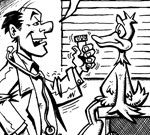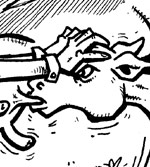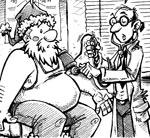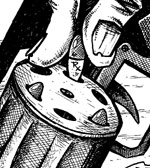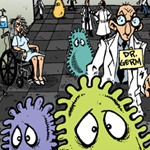Zinc Deficiency - How Much Zinc Should I Take Daily?
| Share on Facebook | Share on Twitter | Share on Google+ |
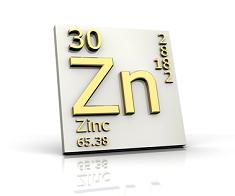 Zinc deficiency is not a common problem for people who have enough to eat, but it can show up in a number of situations that are essentially "trying too hard" to control some aspect of diet or weight loss.Here are the most common problems:
Zinc deficiency is not a common problem for people who have enough to eat, but it can show up in a number of situations that are essentially "trying too hard" to control some aspect of diet or weight loss.Here are the most common problems:
- Zinc deficiency can occur when people adopt high-fiber diets or macrobiotic diets, since plant fiber interferes with the absorption of zinc.
- Taking too much iron (more than 50 to 60 milligrams a day) can interfere with absorption of zinc.
- Taking too much calcium carbonate or calcium phosphate (more than 1,000 mg a day) can interfere with absorption of zinc, but taking calcium citrate malate supplements will not interfere with zinc.
- Taking too much folic acid (more than 1000 micrograms a day) can interfere with zinc.
- Lap band or gastric bypass surgery can interfere with zinc absorption.
Zinc deficiency can also occur to people who have chronic intestinal inflammation or who suffer chronic diarrhea, people who suffer anorexia, and in pregnant women, especially pregnant teens. Zinc deficiencies occur in people who have sickle cell disease.
Symptoms of severe zinc deficiency can be very distressing. It's possible for hair to fall out in clumps. Children fail to gain weight and develop problems with walking and talking. Men and women become infertile, and there can be impaired taste and smell, night blindness, and severe diarrhea.
Milder zinc deficiency results in increased susceptibility to infections in children and older adults, especially diarrhea in children and pneumonia in the elderly.
The good thing about zinc deficiency is that it is very easy to remedy. Almost as soon as you start taking supplemental zinc, deficiency symptoms will go away. How much zinc should I take?
- Newborns to infants six months of age need 2 milligrams per day.
- Babies aged six months to a three years need 3 milligrams per day.
- Children aged four to eight years need 5 milligrams per day.
- Children aged nine to thirteen need 8 milligrams per day.
- After the age of thirteen, females need 9 milligrams per day and males need 11 milligrams per day, although women need at least 14 milligrams per day during pregnancy and nursing.
When it comes to zinc, more is not necessarily better. Taking more than 40 milligrams of zinc a day can interfere with the absorption of copper, and extreme overdose of supplemental zinc can cause permanent damage to the central nervous system due to depletion of copper. (Zinc and copper are transported by the same protein from the digestive tract to the bloodstream.)
A dose of 15 milligrams per day, however, is not too much for children over the age of three years, and a dose of 30 milligrams per day is not too much for adults. The best zinc supplements combine both zinc and copper to ensure nutritional balance.
-
Skin CareMen Skin Care
-
Free ResourcesFree eBooks
-
You can free yourself from aging by reinterpreting your body and by grasping the link between belief and biology.Deepak Chopra
-
Featured Health SupplementAll ingredients are assessed at molecular level to ensure synergy, safety and effectiveness.
 This is crucial because when some ingredients are combined they will help create other substances in the body.
This is crucial because when some ingredients are combined they will help create other substances in the body.
-
